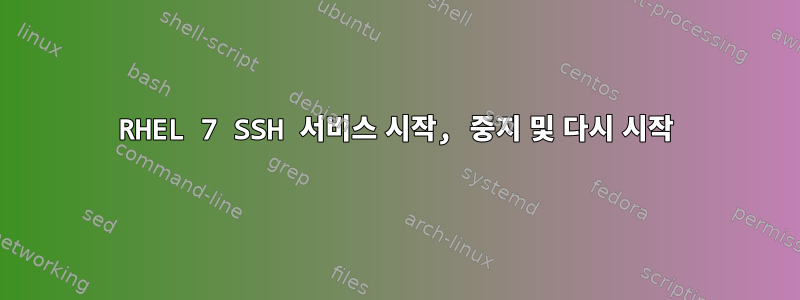
이런 아주 기본적인 질문에 답변을 드려 죄송합니다.
저는 매우 작은 회사에서 개발자로 일하고 있으며 인프라 팀이 새로운 환경을 설정하는 것을 돕기 위해 노력하고 있습니다.
RHEL 5 32비트에서 RHEL 7 64비트로 마이그레이션하고 있습니다.
SSH를 올바르게 설치하고 매개변수화할 수 있습니다.
서비스를 중지, 시작 또는 다시 시작할 때 "출력 태그"라고 부르는 것을 제외하고는 모든 것이 잘 작동합니다. 더 나은 이해를 위해 아래 사진을 참조하시기 바랍니다. 예를 들어 service sshd restart를 사용한 후 화면에 [OK] 및 [FAILED]가 표시된다는 의미입니다.
사진은 라벨을 보여주는 예시일 뿐입니다.
RHEL 5에서는 완벽하게 작동합니다.
RHEL 7에서는 작동하지만 할 수 있습니다아니요동일한 출력([OK], [FAILED] 등)을 갖습니다.
뭔가 빠진 것 같아요.
Google에서 검색했지만 관련 항목을 찾을 수 없습니다.
답변1
이 유형의 출력은 systemd에 대해 활성화할 수 없습니다.https://bugzilla.redhat.com/show_bug.cgi?id=1148571
그러나 실패 여부와 실패한 이유에 대한 추가 정보를 확인하는 방법을 확실히 알려줄 것입니다.
답변2
Redhat 5(및 6)로 돌아가면 다음과 같습니다.내부에용법 /etc/init.d. Redhat 7 사용체계하루 종일 웹을 검색하고 차이점, 장단점 등을 비교하는 기사를 읽을 수 있습니다.
당신은 그랬어요
/etc/init.d/sshd status
/etc/init.d/sshd start
/etc/init.d/sshd stop
/etc/init.d/sshd restart
or you may be more familiar with service sshd <start|stop|restart|status>
RHEL 7에서는 다음을 수행할 수 있습니다.
systemctl status sshd
systemctl start sshd
systemctl stop sshd
systemctl restart sshd
service sshd <start|stop|restart|status> will also work but you'll get an info statement saying "redirecting to /bin/systemctl"
이렇게 하면 보고된 버그를 systemctl status sshd찾을 수 있을 뿐만 아니라 무엇이 잘못되었는지에 대한 명확한 아이디어를 얻을 수 있습니다 ./var/log/messages
RHEL 7.x(및 기타 여러 Linux)에서 서버의 SSHd는 파일에 구성됩니다 /etc/ssh/sshd_config. (a) 그렇지 않으면 서비스가 시작되지 않고 보고되기 때문에 이 파일을 보고 올바르게 설정되었는지 확인해야 합니다.시스템 제어 상태(b) 서비스가 녹색 OK로 시작되면 여전히 시스템에 SSH를 연결하지 못할 수 있습니다.
이는 기본값 /etc/ssh/sshd_config이며 실제로 Centos 7.6에서 제공되지만 SSH 서비스가 시작되지 않으면 기존 백업을 시도해 볼 수 있습니다. RHEL 7.6과 동일해야 합니다.sshd_config도착하다/etc/ssh/sshd_config_oldsshd 서비스가 여전히 시작되지 않으면 이것을 사용하십시오.sshd_config파일 문제는 RHEL/Centos 7 설치와 함께 제공되고 새로 설치하는 모든 사람에게 작동하는 기본 파일이기 때문입니다.
# $OpenBSD: sshd_config,v 1.100 2016/08/15 12:32:04 naddy Exp $
# This is the sshd server system-wide configuration file. See
# sshd_config(5) for more information.
# This sshd was compiled with PATH=/usr/local/bin:/usr/bin
# The strategy used for options in the default sshd_config shipped with
# OpenSSH is to specify options with their default value where
# possible, but leave them commented. Uncommented options override the
# default value.
# If you want to change the port on a SELinux system, you have to tell
# SELinux about this change.
# semanage port -a -t ssh_port_t -p tcp #PORTNUMBER
#
#Port 22
#AddressFamily any
#ListenAddress 0.0.0.0
#ListenAddress ::
HostKey /etc/ssh/ssh_host_rsa_key
#HostKey /etc/ssh/ssh_host_dsa_key
HostKey /etc/ssh/ssh_host_ecdsa_key
HostKey /etc/ssh/ssh_host_ed25519_key
# Ciphers and keying
#RekeyLimit default none
# Logging
#SyslogFacility AUTH
SyslogFacility AUTHPRIV
#LogLevel INFO
# Authentication:
#LoginGraceTime 2m
#PermitRootLogin yes
#StrictModes yes
#MaxAuthTries 6
#MaxSessions 10
#PubkeyAuthentication yes
# The default is to check both .ssh/authorized_keys and .ssh/authorized_keys2
# but this is overridden so installations will only check .ssh/authorized_keys
AuthorizedKeysFile .ssh/authorized_keys
#AuthorizedPrincipalsFile none
#AuthorizedKeysCommand none
#AuthorizedKeysCommandUser nobody
# For this to work you will also need host keys in /etc/ssh/ssh_known_hosts
#HostbasedAuthentication no
# Change to yes if you don't trust ~/.ssh/known_hosts for
# HostbasedAuthentication
#IgnoreUserKnownHosts no
# Don't read the user's ~/.rhosts and ~/.shosts files
#IgnoreRhosts yes
# To disable tunneled clear text passwords, change to no here!
#PasswordAuthentication yes
#PermitEmptyPasswords no
PasswordAuthentication yes
# Change to no to disable s/key passwords
#ChallengeResponseAuthentication yes
ChallengeResponseAuthentication no
# Kerberos options
#KerberosAuthentication no
#KerberosOrLocalPasswd yes
#KerberosTicketCleanup yes
#KerberosGetAFSToken no
#KerberosUseKuserok yes
# GSSAPI options
GSSAPIAuthentication yes
GSSAPICleanupCredentials no
#GSSAPIStrictAcceptorCheck yes
#GSSAPIKeyExchange no
#GSSAPIEnablek5users no
# Set this to 'yes' to enable PAM authentication, account processing,
# and session processing. If this is enabled, PAM authentication will
# be allowed through the ChallengeResponseAuthentication and
# PasswordAuthentication. Depending on your PAM configuration,
# PAM authentication via ChallengeResponseAuthentication may bypass
# the setting of "PermitRootLogin without-password".
# If you just want the PAM account and session checks to run without
# PAM authentication, then enable this but set PasswordAuthentication
# and ChallengeResponseAuthentication to 'no'.
# WARNING: 'UsePAM no' is not supported in Red Hat Enterprise Linux and may cause several
# problems.
UsePAM yes
#AllowAgentForwarding yes
#AllowTcpForwarding yes
#GatewayPorts no
X11Forwarding yes
#X11DisplayOffset 10
#X11UseLocalhost yes
#PermitTTY yes
#PrintMotd yes
#PrintLastLog yes
#TCPKeepAlive yes
#UseLogin no
#UsePrivilegeSeparation sandbox
#PermitUserEnvironment no
#Compression delayed
#ClientAliveInterval 0
#ClientAliveCountMax 3
#ShowPatchLevel no
#UseDNS yes
#PidFile /var/run/sshd.pid
#MaxStartups 10:30:100
#PermitTunnel no
#ChrootDirectory none
#VersionAddendum none
# no default banner path
#Banner none
# Accept locale-related environment variables
AcceptEnv LANG LC_CTYPE LC_NUMERIC LC_TIME LC_COLLATE LC_MONETARY LC_MESSAGES
AcceptEnv LC_PAPER LC_NAME LC_ADDRESS LC_TELEPHONE LC_MEASUREMENT
AcceptEnv LC_IDENTIFICATION LC_ALL LANGUAGE
AcceptEnv XMODIFIERS
# override default of no subsystems
Subsystem sftp /usr/libexec/openssh/sftp-server
# Example of overriding settings on a per-user basis
#Match User anoncvs
# X11Forwarding no
# AllowTcpForwarding no
# PermitTTY no
# ForceCommand cvs server
답변3
RH5 사용SVR4 초기화데몬 프로세스를 관리하는 프로그램입니다. RH7이 떨어졌습니다.SVR4 초기화그리고 그것을로 교체체계.
이 service명령은 더 이상 사용되지 않으며 사용이 중지됩니다. service이제 "new" 명령에 대한 간단한 래퍼입니다 systemctl(LSB 사양과의 재호환성을 위해).
내가 아는 한 systemctl지원되는 유형은 없습니다 .출력 라벨.
프로그래밍 방식으로 서비스 상태를 확인해야 하는 경우 systemctl서비스 상태를 가져오기 위해 제공할 수 있는 여러 "명령"이 있습니다. 예를 들어 systemctl is-active sshd.service,,,,.systemctl is-enabled sshd.servicesystemctl is-failed sshd.servicesystemctl is-system-running sshd.service



